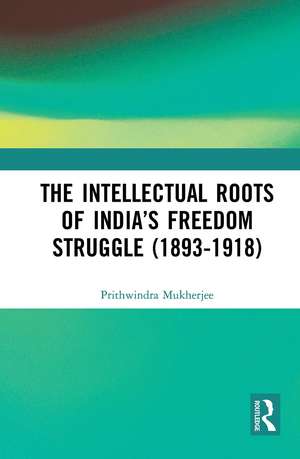The Intellectual Roots of India’s Freedom Struggle (1893-1918)
Autor Prithwindra Mukherjeeen Limba Engleză Paperback – 25 iun 2024
Very well documented with inputs from Indian, European and American archives, the present study carefully straightenes out the origins – philosophical, historical and religious and intellectual, so to say – of Indian nationalism. From Rammohun to Sri Aurobindo, passing through Marx and Tagore, the full set of ideological views has been analysed here.
Unknown up to this day, the sustained focus in this volume on the outlook and the activities of these revolutionaries inside India and abroad brings home the ‘very sophisticated understanding of the contemporary political reality’ that made their leader Jatindranath Mukherjee, the ‘right hand man’ of Sri Aurobindo, the very emblem of an epoch and its aspirations.
Please note: Taylor & Francis does not sell or distribute the Hardback in India, Pakistan, Nepal, Bhutan, Bangladesh and Sri Lanka
Preț: 264.12 lei
Preț vechi: 328.65 lei
-20% Nou
Puncte Express: 396
Preț estimativ în valută:
50.54€ • 52.88$ • 41.98£
50.54€ • 52.88$ • 41.98£
Carte tipărită la comandă
Livrare economică 02-16 aprilie
Preluare comenzi: 021 569.72.76
Specificații
ISBN-13: 9781032652641
ISBN-10: 1032652640
Pagini: 486
Dimensiuni: 152 x 229 mm
Greutate: 0.66 kg
Ediția:1
Editura: Taylor & Francis
Colecția Routledge
Locul publicării:Oxford, United Kingdom
ISBN-10: 1032652640
Pagini: 486
Dimensiuni: 152 x 229 mm
Greutate: 0.66 kg
Ediția:1
Editura: Taylor & Francis
Colecția Routledge
Locul publicării:Oxford, United Kingdom
Public țintă
PostgraduateCuprins
Introduction 1; I. THE GENESIS OF NATIONALISM IN INDIA ; I.1. Ideas they Defended ; 1. The Pioneer: Rammohun Roy (1772-1833) ; 2. After Rammohun (1833-1857) ; I.2. The First Clash of Interests
Karl Marx, the Observer (1857-1860) ; I.3. The Bard of Patriotism; Mahatma Rajnarain Basu (1826-1899) ; I.4. The Quest of the National Soul; Swami Dayanand (1824-1883) ; I.5. The Motherland, a Cult; Bankimchandra Chatterjee (1838-1894) ; I.6. The Soul of Militant Nationalism; Bal Gangadhar Tilak (1856-1920) ; I.7. The Poet of Patriotism; Rabindranath Tagore (1861-1941) ; I.8. Patriotism as Religion; Swami Vivekananda (1863-1902) ; I.9. Patriotism, a Synthesis; Sri Aurobindo (1872-1950) ; II. THE THINKER IN ACTION 124; II.1. Jatin Mukherjee (1879-1915) and the Bengali Society ; II.1.1. From the Gorai to the Ganga ; II.1.2. Meetings in Calcutta ; II.1.3. A Foretaste of Insurrection: 1905 ; II.1.4. Violence, an Antidote ; II.1.5. His Majesty’s Prison ; II.1.6. Secret Revival ; II.2. Revolutionaries Abroad ; II.2.1. In England ; II.2.2. In France ; II.2.3. In Germany ; II.2.4. In the United States ; II.2.4a. Taraknath Das (1884-1958) ; II.2.4b. Ghadar, the Revolutionary Formation ; II.3. The Enemy’s Enemy: First World War ; II.3.1. Bengal Fireworks ; II.3.2. Balasore: Baptism of Blood ; II.3.3. Letters of Jatin Mukherjee ; II.4. Consequences ; II.4.1. In the Far East ; II.4.2. In Europe ; II.4.3. In the USA ; II.4.4. In India: Gandhi Steps In ; III. CONCLUSION ; III.1. Facing the Extremist Perspective ; III.1.1. Tagore and Gandhi ; III.2. The Last of the Prophets ; IV.1. Introduction ; IV.2. ‘The Pioneers’ by Rabindranath Tagore ; IV.3. Tagore on Jatin Mukherjee ; IV.4. Jatin Mukherjee (1879-1915) by M.N. Roy
Karl Marx, the Observer (1857-1860) ; I.3. The Bard of Patriotism; Mahatma Rajnarain Basu (1826-1899) ; I.4. The Quest of the National Soul; Swami Dayanand (1824-1883) ; I.5. The Motherland, a Cult; Bankimchandra Chatterjee (1838-1894) ; I.6. The Soul of Militant Nationalism; Bal Gangadhar Tilak (1856-1920) ; I.7. The Poet of Patriotism; Rabindranath Tagore (1861-1941) ; I.8. Patriotism as Religion; Swami Vivekananda (1863-1902) ; I.9. Patriotism, a Synthesis; Sri Aurobindo (1872-1950) ; II. THE THINKER IN ACTION 124; II.1. Jatin Mukherjee (1879-1915) and the Bengali Society ; II.1.1. From the Gorai to the Ganga ; II.1.2. Meetings in Calcutta ; II.1.3. A Foretaste of Insurrection: 1905 ; II.1.4. Violence, an Antidote ; II.1.5. His Majesty’s Prison ; II.1.6. Secret Revival ; II.2. Revolutionaries Abroad ; II.2.1. In England ; II.2.2. In France ; II.2.3. In Germany ; II.2.4. In the United States ; II.2.4a. Taraknath Das (1884-1958) ; II.2.4b. Ghadar, the Revolutionary Formation ; II.3. The Enemy’s Enemy: First World War ; II.3.1. Bengal Fireworks ; II.3.2. Balasore: Baptism of Blood ; II.3.3. Letters of Jatin Mukherjee ; II.4. Consequences ; II.4.1. In the Far East ; II.4.2. In Europe ; II.4.3. In the USA ; II.4.4. In India: Gandhi Steps In ; III. CONCLUSION ; III.1. Facing the Extremist Perspective ; III.1.1. Tagore and Gandhi ; III.2. The Last of the Prophets ; IV.1. Introduction ; IV.2. ‘The Pioneers’ by Rabindranath Tagore ; IV.3. Tagore on Jatin Mukherjee ; IV.4. Jatin Mukherjee (1879-1915) by M.N. Roy
Notă biografică
Prithwindra Mukherjee (b. 1936) is a poet, historian, musicologist, translator and author of more than sixty books in Bengali, French and English. Based in Paris since 1966, he has received the Chevalier Arts & Letters (2009) and Chevalier Palmes Académiques (2015) from the Government of France. He is the recipient of India's highly prestigious award Padma Shri 2020 for his work in the field of literature and education. The French Academy (Belles Lettres) selected him for its Hirayama Award (Prix Hirayama) 2014. He is also awarded a shield by the Government of Bangladesh for his participation in its grim struggle for freedom.
Descriere
Most people believe India’s struggle for independence to have begun with Mahatma Gandhi. Little credit goes to the proof that this call for a mass movement did not arise out of a void. The present study with inputs from Indian, European and American archives, carefully straightens out the origins – philosophical, historical and religiou
